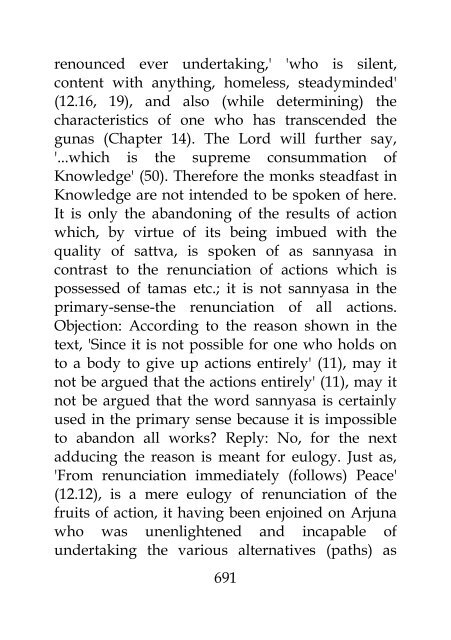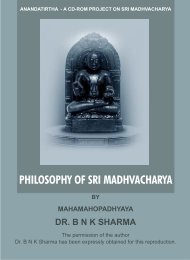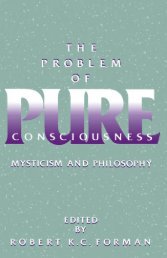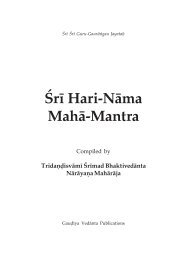- Page 2 and 3:
Srimad Bhagavad Gita English Transl
- Page 4 and 5:
kinsmen (1.37), relatives (1.34) an
- Page 6 and 7:
(rites and duties) alone' (47); 'Th
- Page 8 and 9:
imparted to you from the standpoint
- Page 10 and 11:
Vedas and then enquires into their
- Page 12 and 13:
Nor even do all the statements abou
- Page 14 and 15:
they are to be understood analytica
- Page 16 and 17:
'Tattvamasi, thou art That', with a
- Page 18 and 19:
English Translation of Sri Sankarac
- Page 20 and 21:
2.14 But the contacts of the organs
- Page 22 and 23:
happiness and sorrow when subjected
- Page 24 and 25:
unreal is dependent on awareness, t
- Page 26 and 27:
punah sadbuddheh, etc. so, the next
- Page 28 and 29:
English Translation of Sri Sankarac
- Page 30 and 31:
the A.A. adds 'tatha dhana-nase-apy
- Page 32 and 33:
2.19 He who thinks of this One as t
- Page 34 and 35:
having experienced the process of o
- Page 36 and 37:
does he cause to be killed! [This i
- Page 38 and 39:
stump of a tree?! Vedantin: No, bec
- Page 40 and 41:
enlightened one, does not stand to
- Page 42 and 43:
continues (happily in the town of n
- Page 44 and 45:
e argued that from the expression,
- Page 46 and 47:
2.22 As after rejecting wornout clo
- Page 48 and 49:
stationary, i.e. fixed like a stump
- Page 50 and 51:
2.26 This (verse), 'On the other ha
- Page 52 and 53:
nonperception, as their beginning (
- Page 54 and 55:
2.30 O descendant of Bharata, this
- Page 56 and 57:
English Translation of Sri Sankarac
- Page 58 and 59:
maranat, death. The meaning is that
- Page 60 and 61:
with determination; yuddhaya, for f
- Page 62 and 63:
listen to this (wisdom) from the st
- Page 64 and 65:
ighteousness in the form of Yoga (o
- Page 66 and 67:
2.43 Partha, O son of Prtha; those
- Page 68 and 69:
2.44 And vyavasayatmika, one-pointe
- Page 70 and 71:
and protection. Yoga means acquisit
- Page 72 and 73:
2.47 Your right is for action alone
- Page 74 and 75:
which it is said, 'undertake'? This
- Page 76 and 77:
which, through equanimity, makes ac
- Page 78 and 79:
English Translation of Sri Sankarac
- Page 80 and 81:
samadhau, in samadhi, that is to sa
- Page 82 and 83:
in the Yoga of Knowledge after havi
- Page 84 and 85:
2.56 Moreover, that munih, monk [Sa
- Page 86 and 87:
absolute firmness in withdrawal, an
- Page 88 and 89:
Brahman cannot arise until attachme
- Page 90 and 91:
indriyani, organs; are vase, under
- Page 92 and 93:
seeking Liberation cannot avoid thi
- Page 94 and 95:
2.64 But by perceiving objects with
- Page 96 and 97:
2.66 For the unsteady there is no w
- Page 98 and 99:
etc. (60), and having established t
- Page 100 and 101:
who are really asleep; are said to
- Page 102 and 103:
It towards Itself. [Does the injunc
- Page 104 and 105:
coming from all sides; pravisanti,
- Page 106 and 107:
this, in the state of Brahman-hood
- Page 108 and 109:
own distinct result. Arjuna's quest
- Page 110 and 111:
Knowledge had been spoken of at all
- Page 112 and 113:
y the name of righteousness and are
- Page 114 and 115:
English Translation of Sri Sankarac
- Page 116 and 117:
that in such texts as-'Extending to
- Page 118 and 119:
3.6 One, who after withdrawing the
- Page 120 and 121:
inaction, to non-performance (of du
- Page 122 and 123:
English Translation of Sri Sankarac
- Page 124 and 125:
panca-maha-yajnas, five great offer
- Page 126 and 127:
English Translation of Sri Sankarac
- Page 128 and 129:
knowledge of the Self, it is the bo
- Page 130 and 131:
and santosa means happiness in gene
- Page 132 and 133:
(you should perform your duty) for
- Page 134 and 135:
3.21 Yat yat, [This is according to
- Page 136 and 137:
English Translation of Sri Sankarac
- Page 138 and 139:
yuktah, merged in yoga.-Tr.], he sh
- Page 140 and 141:
English Translation of Sri Sankarac
- Page 142 and 143:
yuddhyasva, engage in battle; sanny
- Page 144 and 145:
3.33 Even a man of wisdom behaves a
- Page 146 and 147:
ecomes mindful only of the scriptur
- Page 148 and 149:
sin, a sinful act; api, even; anicc
- Page 150 and 151:
3.38 Yatha, as; vahnih, fire, which
- Page 152 and 153:
the embodied being; avrtya, by veil
- Page 154 and 155:
error, etc.-V.S.A.] is param, super
- Page 156 and 157:
Chapter 4 English Translation - Swa
- Page 158 and 159:
of their organs, and that the world
- Page 160 and 161:
yours. Aham, I; veda know; tani, th
- Page 162 and 163:
English Translation of Sri Sankarac
- Page 164 and 165:
austerity. 'In that case, You have
- Page 166 and 167:
English Translation of Sri Sankarac
- Page 168 and 169:
such Vedic texts as, 'The Brahmanas
- Page 170 and 171:
should taint them. Owing to the abs
- Page 172 and 173:
to; kim karma, what is action; and
- Page 174 and 175:
certainly on the plane of ignorance
- Page 176 and 177:
a totally opposite perception. And
- Page 178 and 179:
karmas) is inaction; since this pro
- Page 180 and 181:
His own words that there is no resu
- Page 182 and 183:
4.19 The wise call him learned whos
- Page 184 and 185:
away by the fire of wisdom. By way
- Page 186 and 187:
without possessions, he incurs no s
- Page 188 and 189:
accomplished with the mind and spee
- Page 190 and 191:
English Translation of Sri Sankarac
- Page 192 and 193:
action...' (20). Of that very perso
- Page 194 and 195:
a compound word-) in the fire of Br
- Page 196 and 197:
differences among actions, accessor
- Page 198 and 199:
full realization. This is supported
- Page 200 and 201:
which is associated with all the qu
- Page 202 and 203:
withdrawal (samyama) [Samyama consi
- Page 204 and 205:
either inside or outside) ['Three s
- Page 206 and 207:
sacrifices. What to speak of the ot
- Page 208 and 209:
detached'-You will be freed from wo
- Page 210 and 211:
4.34 Viddhi, know; tat, that, the p
- Page 212 and 213:
4.36 Even if you be the worst sinne
- Page 214 and 215:
life) prior to the rise of Knowledg
- Page 216 and 217:
achieving; jnanam, Knowledge; adhig
- Page 218 and 219:
enounced actions through yoga, atma
- Page 220 and 221:
Chapter 5 5.1 Arjuna said -- O Krsn
- Page 222 and 223:
5.3 He who does not hate and does n
- Page 224 and 225:
of the results of the path of Knowl
- Page 226 and 227:
Knowledge). How does it lead to tha
- Page 228 and 229:
vijitatma, controlled in body; jite
- Page 230 and 231:
English Translation of Sri Sankarac
- Page 232 and 233:
not for my gain'; apnoti, attains;
- Page 234 and 235:
is: The embodied one, however, who
- Page 236 and 237:
English Translation of Sri Sankarac
- Page 238 and 239:
theirs-being covered by which ignor
- Page 240 and 241:
5.18 Panditah, the learned ones; sa
- Page 242 and 243:
will also say, 'Being without begin
- Page 244 and 245:
English Translation of Sri Sankarac
- Page 246 and 247:
happiness in external objects. This
- Page 248 and 249:
impulse of desire and anger is cert
- Page 250 and 251:
5.25 Rsayah, the seers, those who h
- Page 252 and 253:
etc., brought to the intellect thro
- Page 254 and 255:
Chapter 6 6.1 The Blessed Lord said
- Page 256 and 257:
his rejection of thoughts for the r
- Page 258 and 259:
'That which they call monasticism,
- Page 260 and 261:
who has given up thought about ever
- Page 262 and 263:
source of such bondages as love etc
- Page 264 and 265:
ecomes manifest, i.e. becomes direc
- Page 266 and 267:
elative;- to all these as also sadh
- Page 268 and 269:
solitary, either naturally or throu
- Page 270 and 271:
e presented here as the primary obj
- Page 272 and 273:
English Translation of Sri Sankarac
- Page 274 and 275:
egulated, whose effort in work is m
- Page 276 and 277:
English Translation of Sri Sankarac
- Page 278 and 279:
English Translation of Sri Sankarac
- Page 280 and 281:
English Translation of Sri Sankarac
- Page 282 and 283:
English Translation of Sri Sankarac
- Page 284 and 285:
6.29 Yoga-yukta-atma, one who has h
- Page 286 and 287:
6.32 O Arjuna, that yogi is conside
- Page 288 and 289:
English Translation of Sri Sankarac
- Page 290 and 291:
possible to be attained through the
- Page 292 and 293:
6.38 Mahabaho, O Mighty-armed one;
- Page 294 and 295:
English Translation of Sri Sankarac
- Page 296 and 297:
English Translation of Sri Sankarac
- Page 298 and 299:
English Translation of Sri Sankarac
- Page 300 and 301:
with its ausxiliaries, and instruct
- Page 302 and 303:
Me; asamsayam, with certainty, with
- Page 304 and 305:
vetti, knows; mam, Me; tattvatah, i
- Page 306 and 307:
of sustenance of life; and yaya, by
- Page 308 and 309:
English Translation of Sri Sankarac
- Page 310 and 311:
discrimination. I am the tejah, cou
- Page 312 and 313:
Tr.] 'The world does not know Me, t
- Page 314 and 315:
ondage of the world. 'If it is that
- Page 316 and 317:
7.17 Of them, the man of Knowledge,
- Page 318 and 319:
gatim, super-excellent Goal to be r
- Page 320 and 321:
English Translation of Sri Sankarac
- Page 322 and 323:
7.23 Since those non-discriminating
- Page 324 and 325:
world; na abhijanati, does not know
- Page 326 and 327:
happiness, sorrow and their causes,
- Page 328 and 329:
hajante, adore; mam, Me, the suprem
- Page 330 and 331:
individual, of actions, of the phys
- Page 332 and 333:
8.2 In order to settle these questi
- Page 334 and 335:
English Translation of Sri Sankarac
- Page 336 and 337:
English Translation of Sri Sankarac
- Page 338 and 339:
8.8 Partha, O son of Prtha; anu-cin
- Page 340 and 341:
as also the strength of concentrati
- Page 342 and 343:
Immutable (Brahman) is that' (ibid)
- Page 344 and 345:
English Translation of Sri Sankarac
- Page 346 and 347:
six months, nor even a year! What t
- Page 348 and 349:
Why are all the worlds together wit
- Page 350 and 351:
same multitude of beings continues
- Page 352 and 353:
the Unmanifested. He is bhavah, the
- Page 354 and 355:
there is nothing superior-; yasya,
- Page 356 and 357:
English Translation of Sri Sankarac
- Page 358 and 359:
krsnah, the dark fornight, means th
- Page 360 and 361:
English Translation - Swami Gambhir
- Page 362 and 363:
Chapter 9 English Translation - Swa
- Page 364 and 365:
knowledge of Brahman shines most br
- Page 366 and 367:
ound;-where?-mrtyu-samsara-vartmani
- Page 368 and 369:
English Translation of Sri Sankarac
- Page 370 and 371:
9.7 O son Kunti, all the beings go
- Page 372 and 373:
English Translation of Sri Sankarac
- Page 374 and 375:
[During creation, continuance and d
- Page 376 and 377:
9.12 Of vain hopes, of vain actions
- Page 378 and 379:
English Translation - Swami Gambhir
- Page 380 and 381:
English Translation - Swami Gambhir
- Page 382 and 383:
9.18 (I am) the gatih, fruit of act
- Page 384 and 385:
worshpping Me according to the resp
- Page 386 and 387:
Vedas-merely the Vedic rites and du
- Page 388 and 389:
O son of Kunti, worship Me alone (t
- Page 390 and 391:
ignorantly out of their devotion to
- Page 392 and 393:
9.27 O son of Kunti, whatever you d
- Page 394 and 395:
9.29 I am impartial towards all bei
- Page 396 and 397:
9.31 Having given up his external e
- Page 398 and 399:
this human life which is a means to
- Page 400 and 401:
English Translation of Sri Sankarac
- Page 402 and 403:
10.5 Buddhih, intelligence-the powe
- Page 404 and 405:
manasa; from My mind-they were crea
- Page 406 and 407:
English Translation of Sri Sankarac
- Page 408 and 409:
their hearts-atmabhavah means the s
- Page 410 and 411:
y the words 'all the sages', still
- Page 412 and 413:
alone; vettha, know; atmanam, Yours
- Page 414 and 415:
again, though spoken of earlier; at
- Page 416 and 417:
10.21 Among the Adityas [viz Dhata,
- Page 418 and 419:
10.23 Rudranam, among the eleven Ru
- Page 420 and 421:
10.26 Sarva-vrksanam, among all tre
- Page 422 and 423:
English Translation of Sri Sankarac
- Page 424 and 425:
things possessed of souls were spok
- Page 426 and 427:
10.34 And I am Death, the destroyer
- Page 428 and 429:
10.36 Chalayatam, of the fraudulent
- Page 430 and 431:
10.39 Ca, moreover; O Arjuna, yat a
- Page 432 and 433:
10.42 Athava, or, on the other hand
- Page 434 and 435:
English Translation of Sri Sankarac
- Page 436 and 437:
And they are nana-vidhani, of diffe
- Page 438 and 439:
form; eva, merely; anena, with this
- Page 440 and 441:
celestial flowers and clothings; di
- Page 442 and 443:
end. Becoming filled with humility,
- Page 444 and 445:
glowing all around, difficult to lo
- Page 446 and 447:
11.19 Pasyami, I see; tvam, You; as
- Page 448 and 449:
e of great purity and holiness, and
- Page 450 and 451:
11.24 O Visnu, verily, seeing Your
- Page 452 and 453:
ulers (pala) of the earth (avani);
- Page 454 and 455:
haste; into a pradiptam, glowing; j
- Page 456 and 457:
Even without you, all the warriors
- Page 458 and 459:
11.34 By saying, 'who have been kil
- Page 460 and 461:
good as dead when the four unconque
- Page 462 and 463:
salutation as well. Ananta, O infin
- Page 464 and 465:
sasankah, the moon; prajapatih, the
- Page 466 and 467:
Yours, of God; yat, whatever; uktam
- Page 468 and 469:
world, You are also pujyah, worthy
- Page 470 and 471:
11.45 Asmi, I am; hrsitah, delighte
- Page 472 and 473:
tava, to you; maya, by Me-who am ra
- Page 474 and 475:
English Translation of Sri Sankarac
- Page 476 and 477:
11.52 Idam, this; rupam, form; mama
- Page 478 and 479:
is devoid of attachment and free fr
- Page 480 and 481:
Chapter 12 12.1 Arjuna said -- Thos
- Page 482 and 483:
is free from purblindness caused by
- Page 484 and 485:
e the supreme God' (Sv. 4.10), 'The
- Page 486 and 487:
greater. We shall speak later of th
- Page 488 and 489:
12.8 Adhatsva, fix manah, the mind-
- Page 490 and 491:
enounce the results of all works by
- Page 492 and 493:
existence together with its cause;
- Page 494 and 495:
ecome identified with God, they wou
- Page 496 and 497:
12.14 Santustah satatam, he who is
- Page 498 and 499:
understand in the right way the dut
- Page 500 and 501:
12.19 Narah, the person; tulya-nind
- Page 502 and 503:
above in, 'He who is not hateful to
- Page 504 and 505:
ksetram iti, as the field-because i
- Page 506 and 507:
mundance existence. And both these
- Page 508 and 509:
God who is present alike everywhere
- Page 510 and 511:
decrepitude, death, etc. do not. (O
- Page 512 and 513:
experiencer, and the very fact of b
- Page 514 and 515:
Liberation of the Self are real in
- Page 516 and 517:
Therefore, such being the case, the
- Page 518 and 519:
understands he is different from ca
- Page 520 and 521:
e knower of the field,' as also, 'K
- Page 522 and 523:
illustration was cited that a deser
- Page 524 and 525:
of ignorance? Opponent: Since ignor
- Page 526 and 527:
way by the gunas of Nature' (3.27),
- Page 528 and 529:
different branches of Vedic texts.]
- Page 530 and 531:
categories. The dasa, ten; indriyan
- Page 532 and 533:
samasena, briefly; udahrtam, spoken
- Page 534 and 535:
13.9 Non-attachment with regard to
- Page 536 and 537:
special kind of attachment consisti
- Page 538 and 539:
gathering of pure and modest person
- Page 540 and 541:
and because they are auxiliary caus
- Page 542 and 543:
strongly girding up the loins and d
- Page 544 and 545:
is meant to present Brahman as inde
- Page 546 and 547:
through th adjuncts in the form of
- Page 548 and 549:
Knowable gets expressed through det
- Page 550 and 551:
13.16 Existing, bahih, outside- the
- Page 552 and 553:
13.18 That is the Light even of the
- Page 554 and 555:
Gita. Who is fit for this true know
- Page 556 and 557:
ecause, there being nothing to rule
- Page 558 and 559:
to be; the hetuh, cause, in the sen
- Page 560 and 561:
with the qualities is the cause of
- Page 562 and 563:
vere 13 with the superimposition of
- Page 564 and 565:
Experiencer: As heat is by fire, si
- Page 566 and 567:
dawn of Knowledge, still is not ill
- Page 568 and 569:
not be that 'all actions' means tho
- Page 570 and 571:
atmanam, Self; atmani, in (their) i
- Page 572 and 573:
which one attains Immortality' (12)
- Page 574 and 575:
elephant created by magic, a thing
- Page 576 and 577:
established that the supreme Lord i
- Page 578 and 579:
another. In this way they destroy t
- Page 580 and 581:
English Translation of Sri Sankarac
- Page 582 and 583:
But this One is not an agent. Hence
- Page 584 and 585:
English Translation of Sri Sankarac
- Page 586 and 587:
Chapter 14 14.1 The Blessed Lord sa
- Page 588 and 589:
Knowledge; na, are not; upajayante,
- Page 590 and 591:
desposits the seed, the agent of im
- Page 592 and 593:
association of happiness, which is
- Page 594 and 595:
attachment-hankering is the longing
- Page 596 and 597:
subduing both rajas and tamas. When
- Page 598 and 599:
14.13 O descendant of the Kuru dyna
- Page 600 and 601:
Tatha, similarly, in that very way;
- Page 602 and 603:
orn; undhavam, higher up, in the wo
- Page 604 and 605:
14.20 Having transcended these thre
- Page 606 and 607:
English Translation of Sri Sankarac
- Page 608 and 609:
into body, organs and objects; vart
- Page 610 and 611:
sah, he; ucyate, is said to have; g
- Page 612 and 613:
absolute, unfailing Bliss by nature
- Page 614 and 615:
in the sense of stambha, perhaps me
- Page 616 and 617:
15.2 The branches of that (Tree), e
- Page 618 and 619:
English Translation of Sri Sankarac
- Page 620 and 621:
15.5 The wise ones who are free fro
- Page 622 and 623:
come to that Abode? Reply: As to th
- Page 624 and 625:
15.8 Yat, when; isvarah, the master
- Page 626 and 627:
unseen objects; na, do not; anu-pas
- Page 628 and 629:
light, brilliance, radiance; which
- Page 630 and 631:
ecoming; somah, Soma; rasatmakah, w
- Page 632 and 633:
knowledge of those who perform evil
- Page 634 and 635:
15.17 But different is th supreme P
- Page 636 and 637:
hence, by virtue of being the most
- Page 638 and 639:
under-standing; etat, this, the scr
- Page 640 and 641:
or Karma-yoga have sattvika qualiti
- Page 642 and 643: 16.3 Tajah, vigour, not the brightn
- Page 644 and 645: Lord says-asurim, demoniacal; sampa
- Page 646 and 647: Prtha, srnu, hear of, understand; t
- Page 648 and 649: ighteousness, unrigtheousness, etc.
- Page 650 and 651: with cares; pralayantam, which end
- Page 652 and 653: 16.14 Asau, that; unconquerable sat
- Page 654 and 655: lood, hair, bones etc., and running
- Page 656 and 657: mam, Me, God-transgression of My co
- Page 658 and 659: ejected, and which is the root of a
- Page 660 and 661: English Translation of Sri Sankarac
- Page 662 and 663: Chapter 17 17.1 Arjuna said -- But,
- Page 664 and 665: threefold-born of sattva, rajas and
- Page 666 and 667: 17.4 Sattvikah, those having the sa
- Page 668 and 669: espectively being shown here so tha
- Page 670 and 671: English Translation of Sri Sankarac
- Page 672 and 673: just as it should be-with the firm
- Page 674 and 675: austerity, austerity accomplished t
- Page 676 and 677: gentleness-that which is called kin
- Page 678 and 679: name, being honoured and worshipped
- Page 680 and 681: English Translation of Sri Sankarac
- Page 682 and 683: 17.24 Tasmat, therefore; yajna-dana
- Page 684 and 685: 17.27 And the steadfastness in sacr
- Page 686 and 687: Brahman, who have fully purified th
- Page 688 and 689: 18.2 The Blessed Lord said -- The l
- Page 690 and 691: 18.3 Eke, some; manisinah, learned
- Page 694 and 695: English Translation of Sri Sankarac
- Page 696 and 697: English Translation of Sri Sankarac
- Page 698 and 699: ondage; and also because they are f
- Page 700 and 701: English Translation of Sri Sankarac
- Page 702 and 703: internal organ has become purified
- Page 704 and 705: emaining at without doing or causin
- Page 706 and 707: after death to those who do not res
- Page 708 and 709: English Translation of Sri Sankarac
- Page 710 and 711: the mind and the intellect.] in num
- Page 712 and 713: 18.16 Tatra is used for connecting
- Page 714 and 715: absolute, unchanging witness of the
- Page 716 and 717: accepted, It should have a change t
- Page 718 and 719: English Translation of Sri Sankarac
- Page 720 and 721: 18.19 Jnanam, knowledge; karma, act
- Page 722 and 723: ased on rajas and tamas, those that
- Page 724 and 725: tamas predominates. Now is being st
- Page 726 and 727: consideration of its consequence, l
- Page 728 and 729: esults of actions; lubdhah, covetou
- Page 730 and 731: anything; and prthaktvena, severall
- Page 732 and 733: understands; ayathavat, wrongly, no
- Page 734 and 735: according as the situation arises f
- Page 736 and 737: English Translation of Sri Sankarac
- Page 738 and 739: the end (of enjoyment); is mohanam,
- Page 740 and 741: 18.41 Parantapa, O scorcher of enem
- Page 742 and 743:
to have been classified according t
- Page 744 and 745:
18.44 The natural duties of the Vai
- Page 746 and 747:
karma-niratah, one devoted to his o
- Page 748 and 749:
For all undertakings are surrounded
- Page 750 and 751:
is not ever-changing, nor is action
- Page 752 and 753:
origination, they (the Viasesikas)
- Page 754 and 755:
(material) causes and becomes fit f
- Page 756 and 757:
two moons, etc. superimposed by the
- Page 758 and 759:
arises from the performance of one'
- Page 760 and 761:
The sentences, 'radiant like the su
- Page 762 and 763:
(momentary) consciousness have conc
- Page 764 and 765:
cannot be that pleasure is for plea
- Page 766 and 767:
(delusion); and niyamya, controllin
- Page 768 and 769:
18.53 (That person) vimucya, having
- Page 770 and 771:
eings', for this will be spoken of
- Page 772 and 773:
the culmination of Knowledge-which
- Page 774 and 775:
to coexistence with duties, like go
- Page 776 and 777:
anything else-; buddhi-yogam, to th
- Page 778 and 779:
actions performed in previous birth
- Page 780 and 781:
sasvatam, eternal; sthanam, Abode,
- Page 782 and 783:
18.65 Bhava manmana, have your mind
- Page 784 and 785:
the dark-ness born of ignorance wit
- Page 786 and 787:
form of sanke etc. and darkness fro
- Page 788 and 789:
then, since Liberation cannot come
- Page 790 and 791:
eing exhausted without creating ano
- Page 792 and 793:
performing nityakarmas is the resul
- Page 794 and 795:
circumstantial inference that, sinc
- Page 796 and 797:
the kamya-Agnihotra). Therefore, it
- Page 798 and 799:
mendicants belonging to the Order o
- Page 800 and 801:
case of a stump and a man, when the
- Page 802 and 803:
and even in the life preceding that
- Page 804 and 805:
ceases in the absence of the false
- Page 806 and 807:
knowledge of Brahman, the realizati
- Page 808 and 809:
Reply: No, for in the case of the '
- Page 810 and 811:
18.67 Idam, this Scripture; which h
- Page 812 and 813:
the supreme Teacher'-. Tho him come
- Page 814 and 815:
various sacrifices, viz rituals, lo
- Page 816 and 817:
ewilderment, natural indiscriminati
- Page 818 and 819:
narrated; vasudevasya, of Vasudeva;
- Page 820:
struck with great wonder. And hrsya







